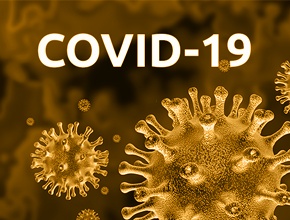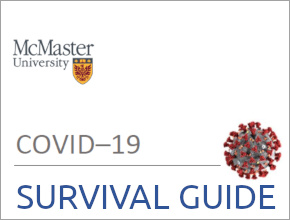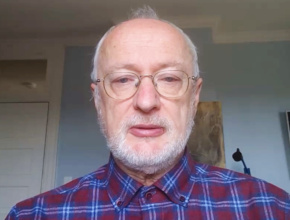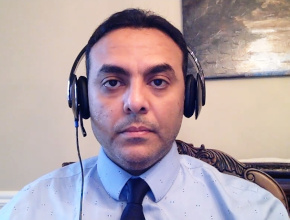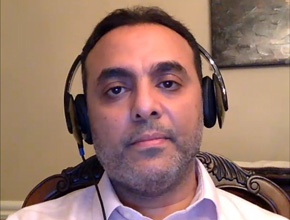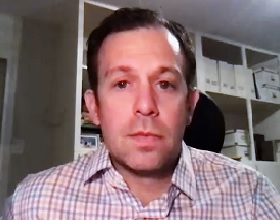Dr Bram Rochwerg, assistant professor in the Division of Critical Care, researcher, and medical lead in the intensive care unit at the Juravinski Hospital, joins Dr Roman Jaeschke to discuss the currently available treatment options for coronavirus disease 2019 (COVID-19) and their use outside of clinical trials.
Roman Jaeschke, MD, MSc: Good morning. Welcome to another edition of McMaster Perspective. Today our guest is Doctor Bram Rochwerg, a clinician from McMaster University. Doctor Rochwerg is a coauthor of numerous practice guidelines dealing with infectious diseases and critical care from the Society of Critical Care Medicine and the European Society of Intensive Care Medicine.
Doctor Rochwerg, thank you for joining us. Have you been looking after patients with coronavirus disease 2019 (COVID-19) already?
Bram Rochwerg, MD, MSc: We have at my hospital. In fact, today I’m on call in our COVID cohorted intensive care unit (ICU).
Roman Jaeschke: There is a major discussion regarding treatments, which are numerous, proposed or even used in algorithms in different places. Do you think that any of them has reached a threshold at which they should be suggested for routine use?
Bram Rochwerg: I do not.
Roman Jaeschke: That’s a short answer. In this case, do you believe we should be using in Hamilton these medications outside the setting of clinical trials?
Bram Rochwerg: It was a short answer, but it summarizes my thoughts on this. Our threshold for starting novel interventions in disease is high, and this is good. This is how we operate in an evidence-informed society. You and I both have been involved in clinical practice guidelines and we know what sort of threshold of efficacy is necessary before we routinely use specific interventions for diseases, whether it be conditional or strong recommendations. This pandemic has brought to the forefront the risks with lowering this threshold of evidence for rolling out medications.
Just like you, I’ve heard of widespread reports of people using antivirals, antimalarials, antibiotics, and immunomodulators in the setting of COVID-19 without sufficient data. I find it scary, I’ll be honest. I think I understand our communal want to feel like we’re doing something, and doing something is better than the alternative, which is doing nothing. But I think this requires a solid reframe in the fact that we are doing something: we’re doing the things for acute respiratory distress syndrome (ARDS) and viral pneumonia that we know to work. That’s supportive therapy. Supporting the lungs, supporting the body, and giving time for these things to clear.
Following the mind-set of, “It’s a pandemic, we’re not going to have randomized controlled trial (RCT) evidence, it’s a Hail Mary, we’ve got to try something.” And this comes right from the top: we’ve had Donald Trump, the president of the United States, leader of the free world—if you believe that—spouting this sort of things. It gets hard to ignore, but I think we have to understand the fact that unanticipated harm is a real possibility here. We’ve already seen that some of these early RCTs have shown benefit and some have shown harm with interventions like hydroxychloroquine and the antivirals.
Not only is concrete harm a risk, but there’s misinformation and false hope. I have a friend whose father was sick with COVID-19 in Florida. She called me up and was so worried. He was intubated and critically ill. But she said, “It’s OK. They’re giving him tocilizumab, they’re giving him hydroxychloroquine, they’re giving him convalescent plasma. He’s gonna survive, because the doctors have told me they’re giving him all these therapies, they’re gonna kill the virus and treat him.” It required so much restraint on my side not to say these physicians are giving her false hope. These are experimental therapies, and that’s all they are. You have equal chance to improve the picture as well as the chance that he was going to get better no matter what, and giving these therapies could worsen his clinical course. It drove home to me the fact that my friend had not been counseled on this and just assumed that there was only benefit, that we are not undertaking a proper shared decision-making model. If you are to give these interventions, they need to be sold to people as purely experimental, with the possibility of equal benefit as well as harm.
Roman Jaeschke: Sounds like you have very strong opinions. If I heard correctly, you also say that if there is shared decision-making with clear exchange of information, including uncertainty and the possibility of harm, and if in such situations the tandem of a clinician and a patient decides to use some unproven intervention, it would be an admissible outcome. Is that correct?
Bram Rochwerg: It certainly is. I think that anytime you’re going to use experimental therapies, there has to be this understanding of the potential harm and benefit. It has to be well understood by the patient, and if the patient’s not able to, then by a family member.
This has to be properly framed, considering resources and costs as well. My friend in the United States, where they don’t have a public health-care system, was paying out of pocket for these interventions that she was certain were going to improve the clinical course of her family member. I do think that perhaps in a situation where a proper informed consent and shared decision-making was enacted, it might be reasonable. Although as a researcher, trialist, and epidemiologist, my own feeling is that why give these in open-label compassionate use observational settings if—I think—the ideal scenario for administering these experimental therapies is in methodologically sound well-thought-out RCTs.
Roman Jaeschke: That’s what I believe we’ll be doing here, in Hamilton, at McMaster University.
One other question. There are clearly opinions—and we have to acknowledge that they exist and are to some degree legitimate—based in psychology, emotions, and previous experiences claiming that not giving a patient “anything” while participating in trials in unethical. I’ve heard somebody talking about adaptive trial designs, in which most if not all patients will get at least 1 of those experimental therapies. Could you explain it a little bit?
Bram Rochwerg: There are a couple of adaptive trials, including ones conducted here, in Canadian labs, as well as international ones, like the REMAP-CAP (randomised, embedded, multifactorial, adaptive platform trial for community-acquired pneumonia) adaptive trial. Certainly there’re multiple domains where you examine antivirals, antibiotics, and immunosuppressants all within the same trial and it’s likely that patients will receive at least 1 active arm, although some will get all the usual care and not get any of these novel therapies.
I appreciate the psychology behind doing something. However, we have to acknowledge the potential of harm with these interventions. We’ve already seen this in some of the reports that have come out, showing side effects with hydroxychloroquine, including cardiac side effects.
This mind-set of “do something” is not new. I’ve talked to colleagues who worked during the Ebola and severe acute respiratory syndrome (SARS) epidemics. Everyone feels like they want to do something. Even in intensive care in general you’re well aware of the many examples of using things like activated protein C, tight glucose control, and many other interventions we thought were worthwhile but when finally tested in a properly done RCT actually led to harm.
I wish as much as the next person there was a cure for COVID-19 or a panacea, but in all likelihood there’s probably not. And in all likelihood when we do the RCTs down the road, when we do them properly, most of these interventions are not going to work. Perhaps 1 or 2 will…
Roman Jaeschke: Let’s hope that at least some of them will, or at least 1 of them will, and let’s try to find which one.
Bram Rochwerg: I hope so too. I think that RCTs are the way to go for now.
Roman Jaeschke: Thank you very much for this interview. I will keep you abreast of opinions of others.
Bram Rochwerg: My pleasure. Thank you for listening.
 English
English
 Español
Español
 українська
українська

